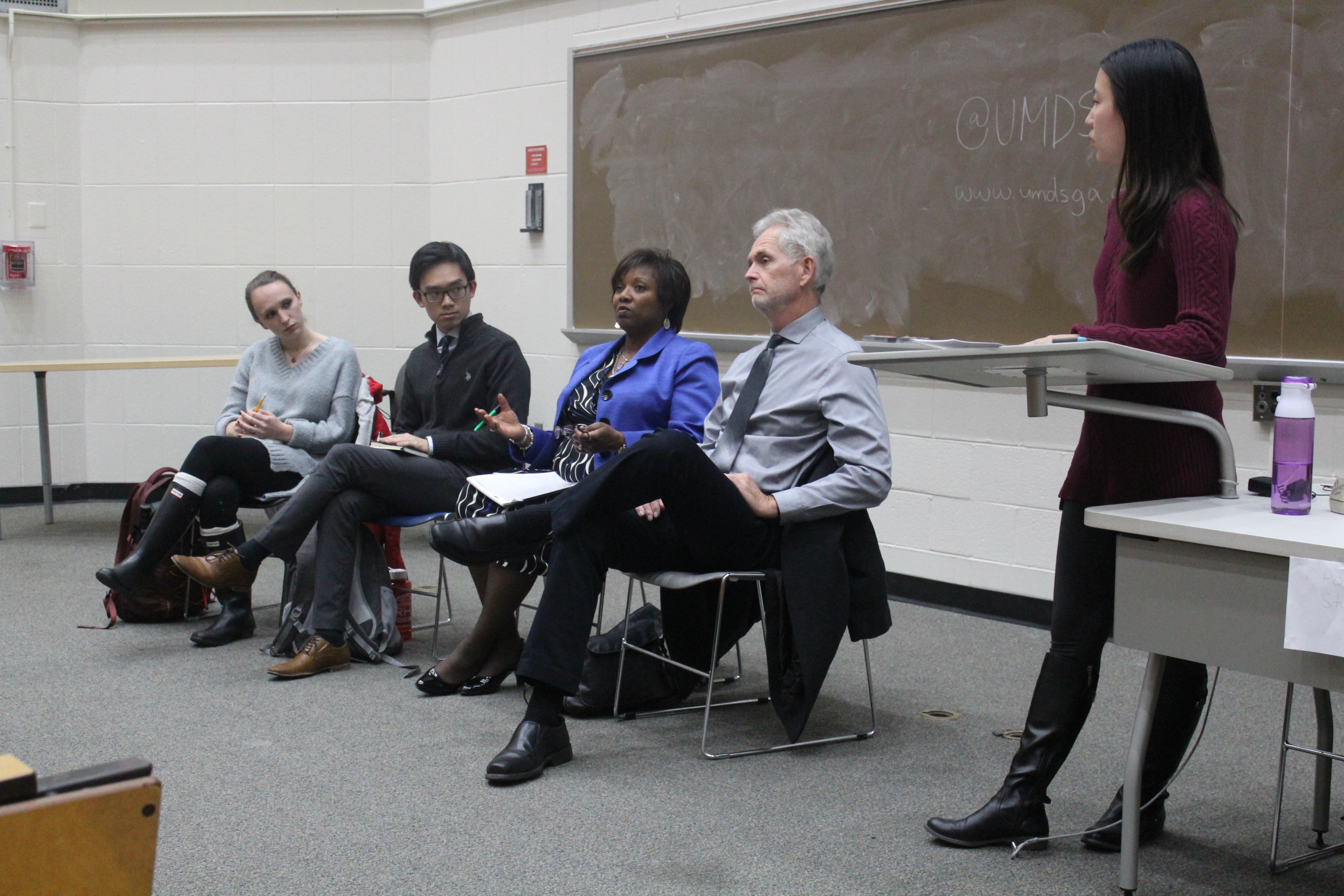The SGA Health and Wellness Committee fostered discussion Monday night about mental health stigma and ways campus resources can be improved at “What’s on Your Mind?” — the organization’s first-ever town hall focused on mental health.
Melanie Zheng, Student Government Association director of health and wellness, led the hour-long discussion in the Art-Sociology Building. The panel included Sharon Kirkland-Gordon and David Petersen, the director and associate director of the University Counseling Center, respectively; Steve Chen, Residence Hall Association president; and Rachael Clinton, an executive board member for the Help Center, a campus hotline students can call to speak to a trained peer-counselor. About 30 people were in attendance.
“We certainly see every year increasing interest for us to come out and talk to student groups as well as faculty and staff members about counseling center services, about how to help people who are in distress, about recognizing signs of mental illness,” Petersen said. “There’s a lot of interest for us in a lot of the campus community to talk about these things.”
Chen and Clinton both cited addressing the stigma around mental health topics, such as depression and general anxiety, as part of their organizations’ goals.
“It’s not ‘cool’ to talk about mental health,” said Clinton, a senior psychology major. “It’s not cool to disclose any kind of mental illness that you’re struggling with, and I think especially in that huge transition from high school to college, it’s not easy to talk about the things you’re struggling with, and you rarely find that normalized.”
One of the main challenges with providing efficient mental health resources is the number of practitioners available to students. The Diamondback reported in 2015 that students often wait two to three weeks between calling for an appointment with the counseling center or the University Health Center’s mental health services and meeting with a therapist because of the high volume of cases. The health center’s mental health services had 50 to 90 appointments a day as of late last year.
The counseling center is in the process of determining what additional funding it may need to expand its resources, Kirkland-Gordon said. She identified the university’s ratio of mental health practitioners to undergraduate and graduate students as one to 1,712 — lower than the International Association of Counseling Services recommendation of one professional for every 1,000 to 1,500 students. The Counseling Center hires temporary psychologists to increase its staff in the fall and spring semesters, she said.
Kirkland-Gordon called the center’s staffing challenge “an interesting kind of dilemma” to have, noting that she believes the demand for counselors is a result of the center’s advocacy to reduce stigma.
“We’re doing such a great job that we haven’t caught up with the demand,” she said. “You bring more and more people in, but your staffing kind of remains the same.”
When the center thinks it has found the right balance of students and practitioners, “we end up having a bump [in the number of cases],” she added.
Kirkland-Gordon and Petersen also addressed the limit of eight therapy sessions a student can have in an academic year, which they said was reduced from 12 about four years ago. The center lowered this maximum based on data they’d collected that showed students’ needs were being met before eight sessions. That average was down to 5.5 sessions for last year, Petersen said.
However, one student in attendance said students might not be motivated to continue therapy off-campus after their sessions were finished, and accessibility to counselors might be hindered by their distance from the campus. Zheng said she and SGA President Katherine Swanson were exploring the possibility of a “ride service” to transport students to off-campus counseling services.
The Health and Wellness Committee is also working with the SGA Information Technology Committee and other campus groups to create an online portal listing all the mental health resources on the campus to help students decide what kind of help they need, Zheng said.
Zheng said she hopes the SGA can move forward on even more mental health initiatives after this town hall.
“I know that I personally have ideas on what to work on moving forward just from our conversation and what people were saying, and that’s always the goal,” she said.



